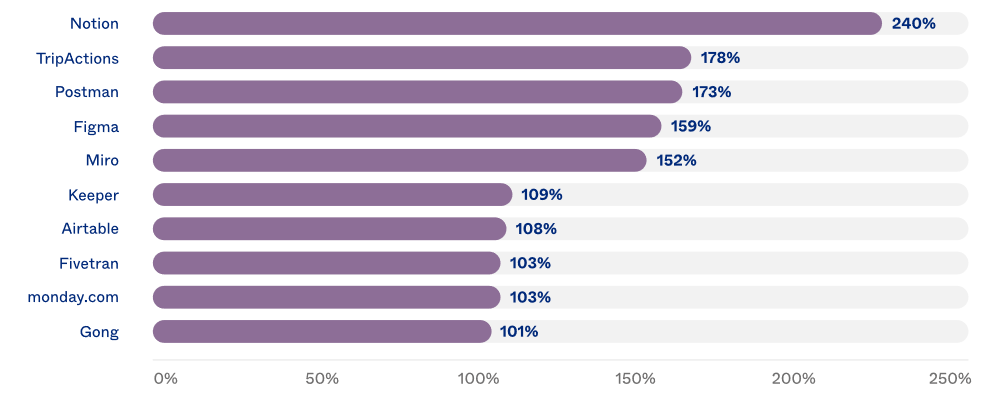Identity management firm Okta has released its Businesses at Work report, and it makes for interesting reading. Its analysis of data from a 14,000-strong customer base reveals the sprawling range of business applications that organisations – an average of 89 apps each, rising to 187 in firms with 2,000+ employees. We were particularly struck by the variety of up-and-coming players in Okta’s ranking of the top 10 fastest growing business apps among its customers. Seven of the top 10 fastest growing apps ranked were new entrants, and half the list is focused on collaboration of one sort or another. Here's a quick rundown of the top 10 fastest growing apps.
The Top 10 fastest growing business apps

1. Notion
The note-taking and collaboration app, founded in 2016, is clearly getting noticed among enterprise customers. (Also: How many productivity apps get to go viral on TikTok?) Whether Notion’s eye-catching customer growth rate of 240% (and 663% growth in unique users) is down to Okta’s customer base being packed full of trend-following TikTokers we can’t say. But in a world rife with collaboration tools, Notion is managing to grow great guns.
The key to Notion's popularity is its flexibility; unlike some of the other collaboration tools in this list, Notion is very much a jack-of-all-trades, with functionality based around creating "blocks" of different types. And while this means it might not be best-in-class at specific tasks, it's pretty good at almost everything, whether that's note-taking, setting up a workflow, or even creating a database.
And for tasks where Notion's in-app functionality may not be ideal, it's often possible to integrate it with another service, getting the best of both worlds. But as this list shows, the collaboration and productivity app space is increasingly crowded - so Notion will have its work cut out to stay ahead.
2. TripActions
With the world starting to open up again in 2021, it’s not surprising a corporate travel organiser app would see substantial growth. But a 178% leap in customers and a 560% jump in unique users suggests a lot of business travellers are turning to the app. Interestingly tech firms are the biggest sector for TripActions – perhaps to deal with a backlog of vital onsite visits?
From its start in 2015 TripActions' USP was "gamifying" corporate travel bookings - initially rewarding users who booked cheaper hotels or flights with gift cards. Tight integration with reward programmes, the ability for organisations to set travel rules, and some smart machine learning to work out what options would be best for prospective travellers made TripActions increasingly popular with enterprises.
After the pandemic cratered corporate travel the firm pivoted to add a fintech product (TripActions Liquid), and also to allow a greater range of employee expenses beyond travel.
3. Postman
According to Okta, API tool Postman is only the second developer-focused product to break into the top-three fastest-growing apps since 2016 (after Atlassian Opsgenie). It’s also one of only three apps to rank for both fastest-growing customer base and unique users (173% and 363% respectively).
Reviews suggest Postman is not only helping with automation, but is itself automating the API development process; one recurring theme is how the app often eliminates the need to hire an API specialist to create and debug a system. Developer tools are not often noted for their user-friendliness, which makes Postman somewhat unique - and helps explain its growing popularity.
4. Figma
Design-focused collaboration tool Figma is among the fastest-growing business apps in Okta’s analysis for the second year running, boasting growth of 159% in 2021. The firm is aiming to make the most of corporate interest, launching Figma Enterprise and its collaborative whiteboard FigJam just this week.
Founded in 2012, Figma's original focus was digital interface design and prototyping, with a collaborative workspace which lets designers, developers and managers work on and see the project evolve in real time. Being browser-based, this also helped Figma bridge the gap between teams with different platforms - such as Macs for design and Windows for developers.
Now Figma is hoping to broaden its appeal beyond the digital design space with products created more specifically for general users: but it has competition, not least from...
5. Miro
A whiteboard and collaboration tool first launched in 2011, Miro also made Okta’s fastest-growing apps list for two years in a row, recording 152% growth last year. Another beneficiary of remote working, with a user-base now numbering more than 30 million, Miro joins the growing number of collaboration apps in the list.
The key to Miro's popularity is its flexibility: some customers use it for brainstorming with virtual post-it notes, some for creating flowcharts, some for presentations, and some for design and artwork. Any one of these elements can transition to or be linked with any of the others, and video conferencing is built into the platform.
6. Keeper
Password managers are firmly in the mainstream, and Keeper is a popular choice for enterprises. Remote working has made password discipline and security even more critical, hence the 109% growth in Keeper’s customer base last year.
Keeper has most of the features anyone would want from a password manager, including zero-knowledge architecture where stored or created passwords are never known to the app, and native applications for all major platforms. The big advantage for enterprises, though, is Keeper's strong integration with Single Sign-On - it can be used with any SAML 2.0 identity provider - along with its ability to set role-based access permissions.
7. Airtable
Another collaboration tool, Airtable is a cloud-based spreadsheet/database, which takes the concept of Excel-as-programming-language to a logical conclusion. While it might not dethrone Microsoft’s spreadsheet behemoth just yet, Airtable did record a 108% jump in customers last year.
Given the depressing-yet-ubiquitous tendency of organisations everywhere to use Excel spreadsheets as ad-hoc databases and applications, Airtable's approach is smart. A database first, it presents itself as a spreadsheet, making it easy to get started - but much more powerful under the surface, and actually designed to create apps and complex tools.
Add to that its collaboration capabilities and a good amount of visual finesse, and it's easy to see why Airtable is taking off.
8. Fivetran
Aiming to help firms make the most of their data, integration app Fivetran saw 103% growth in customer numbers in 2021. Founded in 2012, its pitch is being able to pull data from any siloed database and make it accessible in the cloud.
Like Airtable, Fivetran's functionality makes immediate sense, and like Postman its reviews suggest the app can drastically reduce the need for specialists. And given the Okta survey shows enterprises are using ever more platforms, with ever-more data silos among them, it’s easy to see Fivetran's appeal.
9. monday.com
Another 2012-vintage firm, monday.com is designed to make project management collaborative and straight-forward. Teams can build project workflows, and create functionality and applications within them - for example a CRM or a payroll system.
Collaboration is built into the platform, with the ability to assign tasks, message team-members, add and remove users quickly, and so on. It also offers a plethora of different visualisation options, from straight-forward calendar views, to timelines, Gantt charts and more.
While monday.com doesn't have the deep functionality of tools such as Airtable, its straight-forward interface and accessibility make it increasingly popular among enterprises.
10. Gong
The first ever entry for a sales tool in Okta’s fastest-growing business apps lists with a 101% increase in customers since 2020, “revenue intelligence” app Gong aims to bring AI and data analytics to the sales process. The app analyses everything from how much sales reps talk to what kinds of contacts a potential customer has, with the aim of boosting successful sales.
As with other AI-enabled tools, some of Gong's functionality can seem intrusive - but its ability to help organise and analyse sales-focused interactions, including creating transcripts of calls, sending reminders of previous discussions, and more, are clearly valuable in a growing number of organisations.









